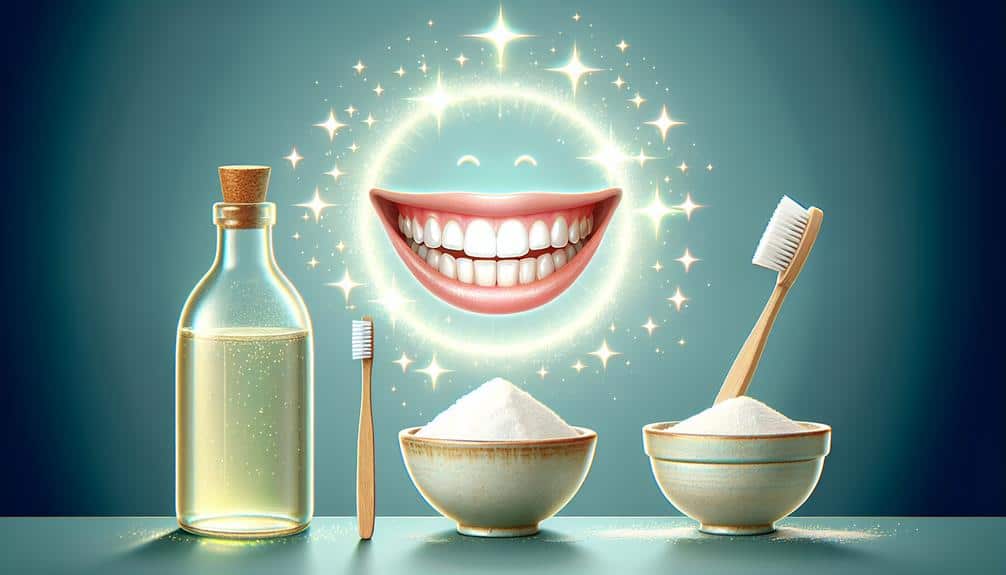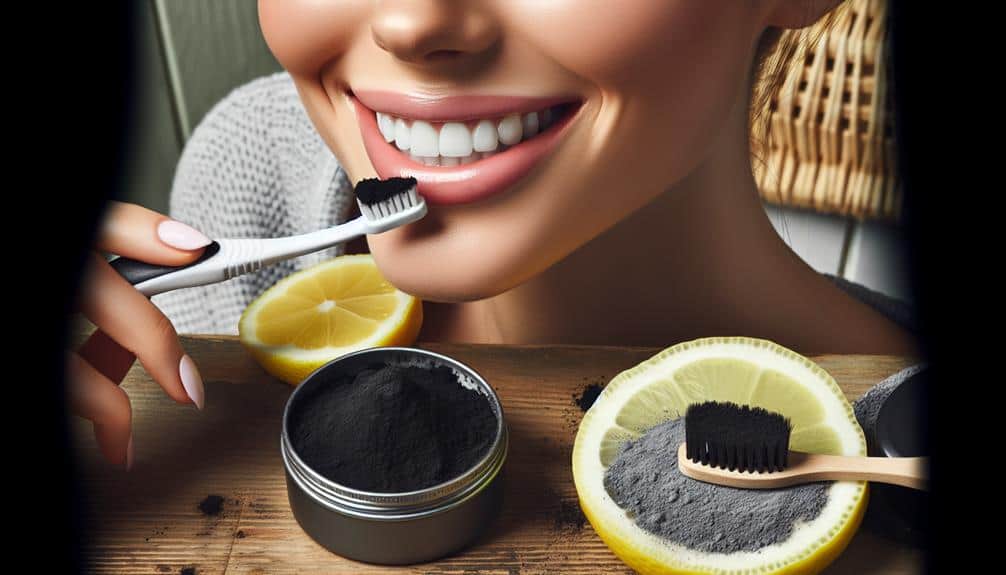To whiten your teeth, consider using apple cider vinegar as it contains acetic acid with antimicrobial properties. This can help kill bacteria, freshen breath, and prevent decay. Dilute it with water, swish for 30 seconds, then rinse for best results. However, be cautious as undiluted apple cider vinegar poses risks to your enamel. Consistent and proper use is key to achieving desired whitening effects. Remember, your dental health is paramount, so consult professionals for guidance on the benefits and dangers. Further insights on teeth whitening methods are available within the topic.
Key Points
- Apple cider vinegar's acetic acid kills bacteria, reduces bad breath, and prevents tooth decay.
- The acidity breaks down plaque and stains on teeth, aiding in whitening effects.
- Research suggests it helps balance pH levels in the mouth, promoting dental health.
- Diluted ACV gargle can enhance teeth whitening and overall oral hygiene.
- Consistent use over time can lead to noticeable whitening effects, but precautions are necessary.
Benefits of Apple Cider Vinegar
When used properly, apple cider vinegar can provide several benefits for oral health, including potential teeth whitening effects. Apple cider vinegar is a natural remedy that has gained popularity for its various health benefits, including its positive impact on dental health.
The acetic acid in apple cider vinegar has antimicrobial properties that can help in killing bacteria in the mouth, reducing bad breath, and preventing tooth decay. Additionally, the acidic nature of apple cider vinegar may aid in breaking down plaque and stains on the teeth, leading to a brighter smile.
Research suggests that apple cider vinegar may also help in balancing the pH levels in the mouth, creating an environment less conducive to the growth of bacteria that cause dental issues. However, it's essential to use apple cider vinegar cautiously to prevent any potential damage to the tooth enamel due to its acidic nature.
Incorporating apple cider vinegar into your oral care routine may be a natural way to promote dental health and potentially achieve teeth whitening effects.
How to Use Apple Cider Vinegar
To effectively use apple cider vinegar for dental benefits, consider diluting it with water before incorporating it into your oral care routine. Apple cider vinegar is acidic and can potentially harm your teeth if used undiluted. Here's how you can safely use it:
- Dilution: Mix one part apple cider vinegar with two parts water to create a diluted solution. This will help reduce the acidity while still maintaining its effectiveness.
- Gargle and Swish: After brushing your teeth, take a small amount of the diluted apple cider vinegar and swish it around in your mouth for about 30 seconds. Be careful not to swallow it.
- Rinse Thoroughly: Once you've swished the solution in your mouth, make sure to rinse your mouth thoroughly with plain water. This will help remove any remaining vinegar and prevent prolonged exposure to your teeth.
Incorporating apple cider vinegar in this manner can provide potential oral health benefits and is a natural remedy for teeth whitening.
Precautions for Using ACV
When using apple cider vinegar, it's important to take certain precautions to protect your teeth and oral health. Apple cider vinegar's acidic properties can erode the enamel of your teeth if not used correctly. To minimize the risk of damage, dilute the vinegar with water before use.
A common recommendation is to mix one part apple cider vinegar with two parts water to create a safer solution for your teeth. Additionally, it's advisable to use a straw when consuming apple cider vinegar to minimize direct contact with your teeth.
After rinsing with apple cider vinegar, wait at least 30 minutes before brushing your teeth. Brushing immediately can spread the acid around and potentially increase the risk of enamel erosion. Regularly using apple cider vinegar without these precautions can lead to enamel damage, tooth sensitivity, and other oral health issues.
Results and Expectations
For ideal comprehension, think about the following statement: 'Achieving noticeable results with apple cider vinegar for teeth whitening typically requires consistent and patient application.'
When using apple cider vinegar for teeth whitening, it's essential to manage your expectations. Here are some key points to keep in mind:
- Gradual Improvement: Results from using apple cider vinegar may not be immediate. It takes time for the acetic acid to break down stains and reveal whiter teeth.
- Consistency is Key: Applying apple cider vinegar regularly and as recommended can help enhance its whitening effects over time. Patience is vital for seeing significant changes.
- Long-term Effects: While apple cider vinegar can whiten teeth, its long-term effects on enamel health are debated. It's advisable to consult with dental professionals to understand potential risks and benefits.
Professional opinions suggest that while apple cider vinegar may offer some whitening benefits, it isn't a substitute for professional whitening treatments. It's important to manage expectations, be consistent in use, and prioritize overall oral health.
Alternatives to Apple Cider Vinegar
Consider exploring other natural teeth whitening options that can be effective and safe for maintaining a bright smile.
Lemon juice is a popular alternative to apple cider vinegar for teeth whitening. The citric acid in lemon juice has natural bleaching properties that can help lighten stains on your teeth. However, it's important to use lemon juice in moderation as its high acidity may erode tooth enamel over time.
Another option is baking soda, which is known for its mild abrasive properties that can gently scrub away surface stains on teeth. Baking soda is often used in commercial toothpaste for its whitening effects. You can create a paste by mixing baking soda with water and brushing your teeth with it a few times a week. Just like with any teeth whitening method, it's crucial not to overdo it to prevent damage to your enamel.
Both lemon juice and baking soda can be effective natural alternatives to apple cider vinegar for teeth whitening. Remember to consult with your dentist before trying any new whitening methods to make sure they're suitable for your dental health.
Frequently Asked Questions
Can Apple Cider Vinegar Help With Other Dental Issues Besides Teeth Whitening?
Apple cider vinegar can help enhance gum health by combating bacteria and reducing plaque buildup. It may also relieve bad breath and sensitivity. However, it is crucial to dilute it properly to prevent harming your teeth.
Is It Safe to Use Apple Cider Vinegar for Teeth Whitening if You Have Sensitive Teeth?
If you have sensitive teeth, using apple cider vinegar for whitening may not be ideal. It can cause enamel erosion and worsen sensitivity. Consider alternatives like whitening toothpaste or professional treatments. Prioritize your dental health and consult your dentist.
Can Apple Cider Vinegar Damage Tooth Enamel if Used Regularly for Whitening?
Using apple cider vinegar for teeth whitening can lead to potential risks like enamel erosion if used regularly. It's important to be cautious and consider alternative methods to protect your tooth enamel.
How Long Does It Typically Take to See Noticeable Results When Using Apple Cider Vinegar for Teeth Whitening?
To see noticeable results when using apple cider vinegar for teeth whitening, typically takes a few weeks. This timeframe can vary based on consistency and methods of application. Effectiveness increases with regular use and proper oral care.
Are There Any Specific Types or Brands of Apple Cider Vinegar That Are Recommended for Teeth Whitening Purposes?
When choosing apple cider vinegar for teeth whitening, opt for raw, organic types like Bragg's. These varieties retain beneficial enzymes and nutrients. DIY recipes often recommend these types for their potential teeth whitening benefits. However, always follow precautions to protect enamel.



